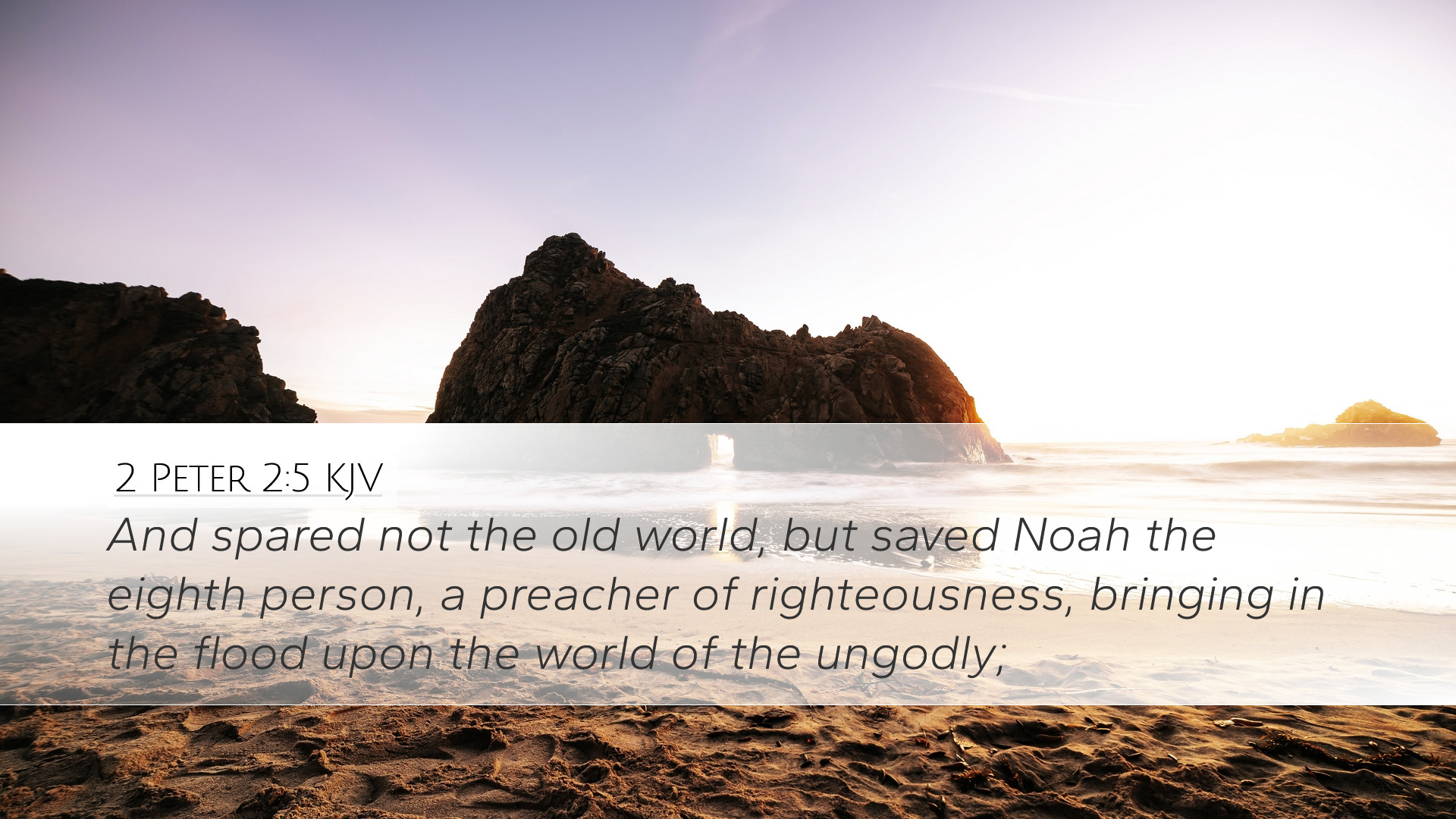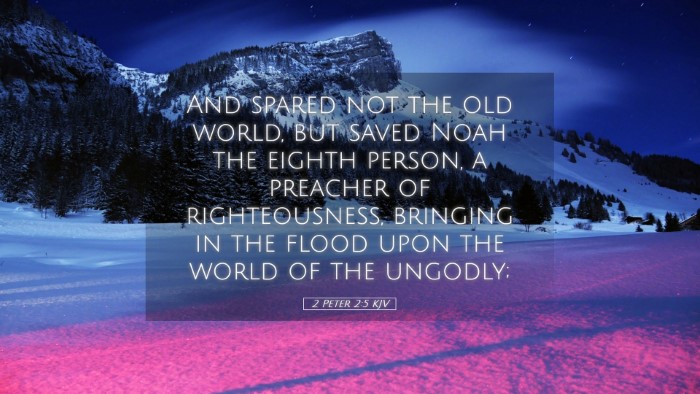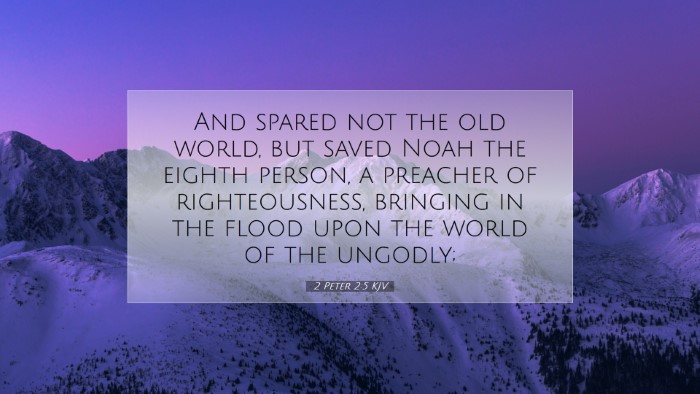Old Testament
Genesis Exodus Leviticus Numbers Deuteronomy Joshua Judges Ruth 1 Samuel 2 Samuel 1 Kings 2 Kings 1 Chronicles 2 Chronicles Ezra Nehemiah Esther Job Psalms Proverbs Ecclesiastes Song of Solomon Isaiah Jeremiah Lamentations Ezekiel Daniel Hosea Joel Amos Obadiah Jonah Micah Nahum Habakkuk Zephaniah Haggai Zechariah Malachi2 Peter 2:5
2 Peter 2:5 KJV
And spared not the old world, but saved Noah the eighth person, a preacher of righteousness, bringing in the flood upon the world of the ungodly;
2 Peter 2:5 Bible Commentary
Commentary on 2 Peter 2:5
"And spared not the old world, but saved Noah the eighth person, a preacher of righteousness, bringing in the flood upon the world of the ungodly;" (2 Peter 2:5, KJV)
Introduction
In this verse, the Apostle Peter draws upon historical examples from the Old Testament to illustrate divine judgment and deliverance. The reference to Noah and the flood serves as a powerful reminder of God’s justice, the consequences of sin, and the hope found in righteousness. Exploring this verse through the insights of noted commentators provides a deeper understanding of its implications for both the historical context and contemporary application.
The Context of Judgment
Peter is addressing the false teachers and the moral decay within the church. He uses the flood narrative to demonstrate that God is not slack concerning His promises nor indifferent to ungodliness.
Albert Barnes emphasizes that the "old world" refers to the antediluvian society, marked by wickedness that prompted God's judgment. The sparing of Noah amid widespread destruction highlights God's mercy and the principle that divine judgment often coexists with divine protection.
Noah: The Preacher of Righteousness
Noah's role as a "preacher of righteousness" is significant. Matthew Henry points out that Noah not only built the ark but also warned his contemporaries of the impending judgment, representing a faithful proclamation of God’s message. This underscores the calling of believers to live and articulate righteousness amid a corrupt world.
Adam Clarke elaborates that Noah’s preaching was coupled with his actions; his construction of the ark was itself a testament to his faith and obedience. By his example and message, Noah becomes an archetype for all who strive to maintain faithfulness in a world that often rejects God’s warnings.
Divine Deliverance
The phrase “saved Noah the eighth person” highlights the preservation of a remnant. Matthew Henry notes that Noah was not just saved for personal safety; he was chosen to spearhead a new beginning for humanity post-flood. This illustrates how God provides a means of salvation and a remnant through which His purposes are fulfilled.
Moreover, the reference to Noah's family (as the “eighth”) signifies the continuation of godly lineage and the establishment of covenantal relationships that God desires with humanity.
The Flood and Ungodliness
The flood's mention serves as a stark reminder of the destructive power of sin and God’s righteous judgment against the ungodly. Albert Barnes warns that the flood is not just a historical event but a typology of future judgments that await the ungodly. It calls for an urgent reflection and self-examination amongst believers regarding their walk with God and the prevailing culture.
Theological Insights
The theological implications of 2 Peter 2:5 encompass themes of judgment, salvation, and the perseverance of the righteous. It resonates with Romans 1:18-32, where the wrath of God is revealed against unrighteousness, underscoring that divine justice will always prevail.
Matthew Henry reflects on how the history of Noah serves as an encouragement for believers to trust in God's final judgment, even when it seems delayed. God’s historical interventions are assurance that He is actively involved in the unfolding of redemption and justice.
Contemporary Relevance
For contemporary believers, 2 Peter 2:5 serves as both a warning and an encouragement. Adam Clarke asserts that as the world mirrors the antediluvian society marked by increasing immorality, Christians are reminded to remain steadfast in their witness, like Noah. The call is not just to personal righteousness but to proclaim God's righteousness boldly in a world where it is often ridiculed.
Furthermore, understanding that God preserves His people amid widespread judgment invites hope and perseverance. Churches and ministries can glean from Noah’s example, encouraging congregations to engage in acts of righteousness that reflect God’s love and truth, thereby acting as lights in darkness.
Conclusion
In summary, 2 Peter 2:5 encapsulates profound theological truths about God’s judgment, the significance of righteousness, and the hope of deliverance. Through the combined insights of Matthew Henry, Albert Barnes, and Adam Clarke, it becomes apparent that this verse serves not merely as a historical account but as a vital narrative calling all believers to live righteously and proclaim the truth amid a hostile world.
Prayerful Reflection: May we take to heart the lessons of Noah, embodying faithfulness and commitment to righteousness, ever mindful of the God who judges and saves.


